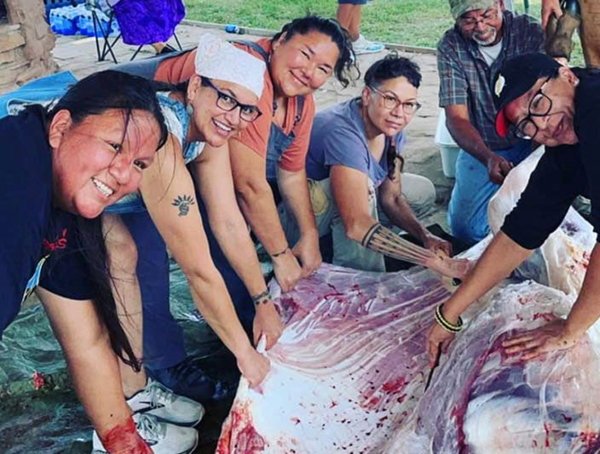Let’s back up a bit. Everyone talks about decolonizing, but what does that even mean? In terms of food sovereignty, we’re talking about getting back to the foods of our ancestors. Unfortunately, our entire food system is determined by colonization, and our palates have also been colonized, largely by salt and sugar—so we believe that everything we eat needs to be salty or sweet. Our palates have forgotten how wonderful and healthful flavors like pungent and bitter can be.
“The fact is that our current food system pours herbicides, pesticides, and fungicides on so much of our food.”
For example, my husband’s people are Lakota, and during the cold winter months when there aren’t any bitter greens to eat, they would traditionally get bitter compounds from various parts of the buffalo. So they would dip pieces of meat in the bitter bile of the buffalo’s gallbladder. Similarly, one of my Ojibwe friends told me that during the winter, they would dip pieces of fish in the fish bile then eat it.
It’s that kind of knowledge of the people who came before us—about not only what is good to eat but what keeps us going physically, mentally, emotionally, and spiritually—that is going to lead us into the future of food sovereignty. Traditional ecological knowledge is different from Western ecological knowledge in that it includes and understands the importance of culture and spirituality.
For instance, why is fry bread so popular as an Indigenous food? It’s not just that our palates now love gluten and sugary, salty foods. It’s also that people have watched their grandma make fry bread, so there’s this emotional and spiritual connection to that food. We need to rebuild those connections with our traditional foods, those really visceral memories of processing wild rice and cutting up bison meat to hang and dry. I have beautiful memories of making kimchi, a traditional Korean food, with my mom.
The fact is that our current food system pours herbicides, pesticides, and fungicides on so much of our food. Our meat is laced with all kinds of hormones and antibiotics. Not to mention that industrial agriculture is hugely destructive to the environment. In order for us to move away from that, we have to get back to foods that love growing here, foods that we have a long-term relationship with.
We’re trying to grow crops that would love tons of precipitation that we just don’t have. We’ve also destroyed our topsoil, so we now have to put minerals and other nutrients back into the soil. It’s just hugely destructive and contributes to climate change. So if we get back to traditional foods through traditional ecological knowledge, we won’t have the full-scale destruction brought on by industrial agriculture.
Our consumption culture really contributes to climate change as well. When you build a relationship with the natural world, you start to realize that plants and animals are beings that have more value than just their monetary value. You start being more careful about how you move through the world and how you walk on the land. When you have a relationship with plants and animals, you’re a lot less likely to use and abuse these gifts. Instead, you’re going to make sure they’re well taken care of for future generations.
“We’ve got to change our diets so we can break that vicious cycle of a poor diet leading to poor health, which then leads to higher risk factors.”
How can we improve our relationship with plants, animals, and the natural environment around us?

